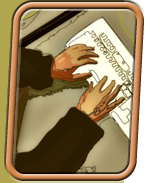|
|
||||||
|
|
|
|
||||
|
|
|
|
|
|
||
|
|
||||||
|
|
|
|
||||
|
|
|
|
||||
|
|
|
 |
|
|
|
|
|
|
|
|
|
|
|
|
|
|
|
|
|
|
|
|
|
|
|
|
|
High and Low The Washington Post Book World By the time the search party found him high atop New Hampshire's Mt. Lafayette in February 2000, Guy Waterman -- a former star Republican aide on Capitol Hill, speechwriter for General Electric bigwigs, author and passionate outdoorsman -- was "hard as marble." His frozen 67-year-old body was on its side; his arms were against his chest, and, in the eyes of one who discovered him in a rock alcove just off the trail, his face bore a Mona Lisa-like smile. Smiling Waterman very well may have been. He had arrived successfully at a contrived end: a snowy suicide that he had meticulously planned since at least 1998, right down to packing aspirin to hasten unconsciousness. Freezing to death was the last deliberate act of a very deliberate man. His end was also -- as Chip Brown makes plain in Good Morning Midnight, an engrossing and finely crafted narrative of Waterman's life -- imbued with a wicked irony. Mountain climbing and an iron-strong commitment to an almost impossibly simple Vermont homestead had proved to be restoratives for Waterman, racked as he had been by the familiar, crippling vice of alcoholism. Waterman left Washington and drinking and his first wife to pursue a new life in the woods of New England with his second wife, Laura. There they could climb, play jazz on their piano and, in a word, escape. Brown calls Barra, the couple's homestead, Waterman's "recollection of childhood happiness." As much as anything, Good Morning Midnight is a deep exploration of a life lived as close to nature as humanly possible, and Brown deftly renders the day-to-day goings-on of an extraordinary existence: counting blueberries, stuffing pillows with milkweed, reading by kerosene lamp. The result: a literate primer on homesteading, an extreme form of American independence. But independence, for Waterman, came at a high price: his relationship with his sons. The book thus enters psychoanalytic territory, risky business for any author, but Brown pulls it off with the help of Waterman's letters and unpublished autobiography. Building Barra meant that Waterman couldn't pay for his boys' educations -- "I walked away from that responsibility," he wrote -- and he became, in effect, a deadbeat dad. Heartbreakingly, his son Johnny preceded him in death, vanishing on Alaska's Mount McKinley, while son Bill went on a trip, never returned and was presumed dead. Tired and depressed, Waterman slowly gave up. "I'll be joining Johnny," he wrote just before he died. He planned everything with the consent and even the help of Laura, who showed her husband a rare form of devotion. "Why did he do it?" is among the first questions any of us asks when we hear of a suicide. Killing oneself is as morally complicated a human subject as one can broach, but never is it done for nothing. Those interested in why one man ended it all -- and in the singular life leading up to his exit -- should read Brown's compelling, eerie dirge of a book. Right around the time Waterman's first marriage began to seriously fray, another determined, intense man was making his historic way up Chomolungma, popularly known in the West as Mount Everest. Tenzing was the expedition's Buzz Aldrin to Edmund Hillary's Neil Armstrong: one step behind. But as Tenzing: Hero of Everest, Ed Douglas's near-hagiography, makes clear, the Tibet-born Sherpa was no less a hero to many Asians and others in spite of being runner-up. Tenzing, who died in 1986, was possessed of a Watermanesque single-mindedness: "I can't stop until I have climbed Everest," he is said to have told his wife, and it was little wonder that he did eventually reach the summit, having assaulted the mountain so many times prior to the achievement. Indeed, his quest to conquer Everest endeared him to the many Europeans he served, inasmuch as mountaineering was of little importance beyond money-making to his Himalayan porter brethren. "Here at last was a Sherpa who appreciated what drove the sahibs in their endeavors," Douglas writes, reproducing the camaraderie between Tenzing and a Swiss climbing team. Tenzing could easily have lived out his days as a herder or farmer, but as Douglas puts it, "The excitement of the outside world enthralled him." Everest was literally at the top of that world; it was the shining prize in the sky, and he grabbed it. Tenzing's life and times are ripe material for an engaging story, which makes it all the more regrettable that Douglas, a mountaineer, journalist and editor of Alpine Journal, wasn't able to fashion one. Despite all the potential for a gripping rags-to-riches biopic, we have instead a creaky exercise in documentary, moving slowly through expedition after expedition. More troubling is Douglas's excessive reliance on previously published works, especially Tenzing's (ghostwritten) autobiography, Tiger of the Snows. But if the book is not a page-turner, it is at least complete in its portrayal of a great man, his lasting accomplishment and the complex fame it brought to him. Tenzing traveled the world in style and met celebrities and royalty, but he was used as a symbol of Asian nationalism, was neglected by his new, much-younger wife and fell into drink and depression. For all its success, the life of Tenzing Norgay reminds us that, like mountains, all men -- in New Hampshire or the Himalayas -- have their dark sides.
|